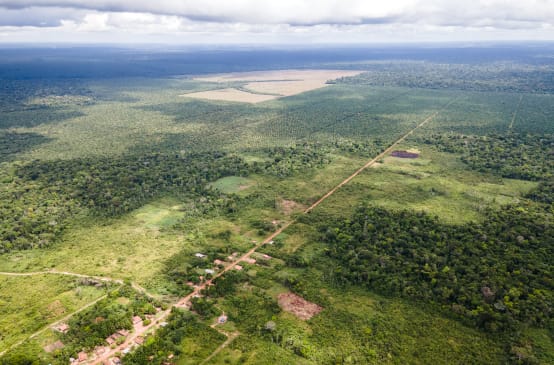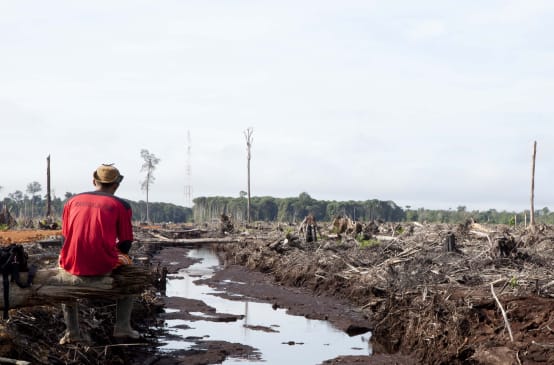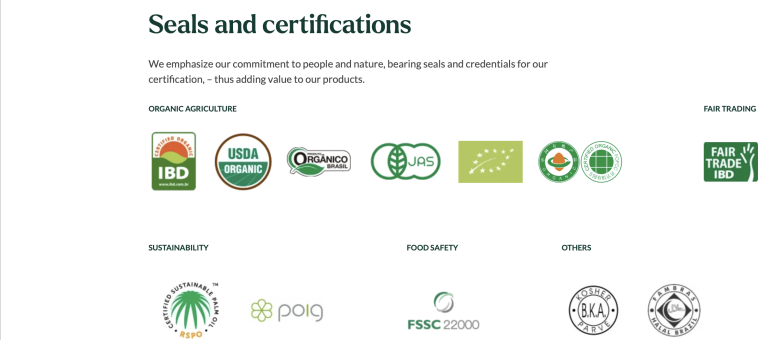Brazil: Agropalma’s “certified palm oil” seals under fire
Brazil: Rainforest Rescue is investigating the role of certification companies such as IBD in the fraudulent labeling of supposedly sustainable palm oil. This follows allegations of land grabbing, violence and poor working conditions in the Amazon rainforest against the certified palm oil company Agropalma.
For 15 years, the Brazilian company Agropalma has been considered a model for the palm oil industry worldwide. Ten different international seals awarded to the company are supposed to support this claim.
But there is clearly a huge gap between claim and reality: We have already drawn attention to this with the petition “Brazil: Stop land grabbing and violence for ‘fair and sustainable’ palm oil!”. 68,000 people have signed the petition to date.
In response to the allegations, the Brazilian certifier IBD has suspended Agropalma’s seal from the Roundtable on Sustainable Palm Oil (RSPO). The suspension took effect on February 8, 2023, as confirmed by the RSPO Secretariat in Kuala Lumpur in response to our inquiry on March 30.
As part of the investigation against Agropalma for land grabbing and land title fraud, IBD, which claims to be the largest certifier of organic products in Latin America, has also been targeted by the Brazilian authorities.
“IBD is a certifier that gives credibility to companies like Agropalma so that they can sell their products to large international consumers,” explains Brazilian prosecutor Ione Nakamura in an interview with the journalist collective Convoca.
“The public prosecutor’s office of the state of Pará found in its investigation that the certifier IBD did not take into account the criteria for the protection of human rights,” continues Nakamura.
After years of investigation and litigation, courts in Brazil have now annulled the title deeds to a total of 58,000 hectares of Agropalma land – more than half of the land claimed by the palm oil company. Further cases are underway and there is a risk of more land being cancelled, including the certified oil palm plantations AGROPAR, CRAI I, CRAI II and AGROPALMA. The oil palm plantations were established in the Amazon rainforest in the state of Pará between 1982 and 2002.
Agropalma, however, continues to claim the land – a total of 107,000 hectares in the Amazon region – as its own and does not admit to the fraud proven by the courts. Instead, Agropalma appears to be continuing to try to legalize the land with the help of the state land agency ITERPA. The public prosecutor’s office in Pará has filed an injunction against this.
Seals have no legal value
The public prosecutor’s request that IBD revoke Agropalma’s RSPO certification was ultimately rejected by the court because the RSPO label and certification is a purely private service without any legal force or effect: “The court ruled that IBD’s certification cannot be revoked by the courts,” Convoca quotes prosecutor Nakamura as saying.
The RSPO, on the other hand, dismissed a complaint about Agropalma’s land conflicts in 2020 after five years of proceedings on the grounds that the land dispute was a matter for the Brazilian courts. Agropalma, for its part, described the complaints as “absurd claims”.
According to O Fato, there had been criticism and calls for the certifier IBD to withdraw the RSPO seal since it was awarded to Agropalma in 2011. Instead, IBD repeatedly renewed the certification until February 8 of this year.
The court rulings already handed down in Brazil and the ongoing proceedings call into question not only Agropalma’s operations, but also all the seals and certificates awarded to the palm oil company. One of the conditions for the award is that Agropalma is the legal owner of the land.
RSPO certifications are often suspended for a limited period of time, only to be reinstated a short time later. It is clear that business interests take precedence over other concerns such as human rights, environmental protection and compliance with the law.
Certifiers are financially dependent on palm oil companies
The palm oil companies themselves decide who will award the RSPO seal and verify compliance with the RSPO's – woefully inadequate – standards. They can choose a suitable company from a pool of accredited certifiers and pay them directly for their services. The RSPO currently lists 26 accredited certifiers.
The certifiers are financially dependent on the palm oil companies, which weakens their position significantly and leads to serious conflicts of interest. Since overly strict certifiers are not in demand by potential clients, this creates a perverse incentive for them not to audit too closely.
In addition, certifiers such as IBD carry out audits and certifications after prior notification – at locations agreed with the palm oil companies and based mainly on information provided to them by the companies to be certified.
This results in certifiers being very lax in verifying compliance with the already inadequate RSPO standards in order to stay in business.
Certifier IBD suspended in 2022 – no reason given
To verify the work of the certifiers, the RSPO relies on the services of another certifier, ASI Assurance Services International GmbH (ASI) of Germany. According to ASI, the Brazilian certifier IBD, which issued the RSPO label to Agropalma, was audited and suspended worldwide from certification with the RSPO palm oil label on June 8, 2022. ASI announced this six months later. Unfortunately, the reasons for IBD’s suspension are completely unclear to the public, as is ASI’s reinstatement of IBD on February 4, 2023.
In addition to the RSPO seal, IBD has granted Agropalma five other international seals. No information is available on the status of these seals. Agropalma is also certified according to the Japanese organic standard JAS (certifier CERES GmbH) and the Chinese standard FOFCC for organic farming. The Swiss organic seal Bio Suisse did not renew Agropalma’s certification in 2022 – without giving any reason.
Rainforest Rescue has written to the 20 companies that purchase palm oil from Agropalma (see the background section of our petition), as well as to the various seal organizations and certifiers, asking for clarification. We will report on their responses shortly.
IBD 2023. Who we are: https://www.ibd.com.br/about-us/?lang=en
Tribunal de Justiça do Estado do Pará (TJPA) 2020. PJe – Processo Judicial Eletrônico Número: 0801353-35.2020.8.14.0015: https://www2.mppa.mp.br/data/files/EB/45/20/88/452C17107E4491F6180808FF/ACP_AGROPALMA_PORTO%20ALTO_%20FINAL%20_2_.pdf
Convoca 2023. IBD, la certificadora que avala a empresas de palma aceitera con denuncias ambientales en Perú, Brasil y Guatemala: https://web.archive.org/web/20230314015830/https://convoca.pe/investigacion/ibd-la-certificadora-que-avala-empresas-de-palma-aceitera-con-denuncias-ambientales
or
Publica 2022. Com inércia do governo, empresas do dendê avançam sobre terras públicas da Amazônia: https://apublica.org/2022/08/com-inercia-do-governo-empresas-do-dende-avancam-sobre-terras-publicas-da-amazonia/
Ver O Fato 2022. BOMBA – Acusada de grilagem e com 58 mil hectares cancelados pela justiça, Agropalma está à venda:https://ver-o-fato.com.br/bomba-acusada-de-grilagem-e-com-58-mil-hectares-cancelados-pela-justica-agropalma-esta-a-venda/
Tribunal de Justiça do Estado do Pará (TJPA) 2020. PJe – Processo Judicial Eletrônico Número: 0801353-35.2020.8.14.0015: https://www2.mppa.mp.br/data/files/EB/45/20/88/452C17107E4491F6180808FF/ACP_AGROPALMA_PORTO%20ALTO_%20FINAL%20_2_.pdf
Ministério Público del Estado de Pará 2022. MPPA propõe Reclamação para garantir autoridade de decisão do Tribunal de Justiça. Promotoria Agrária pede a suspensão de edital de compra de terras públicas referentes às Fazendas Roda de Fogo e Castanheiras: https://www2.mppa.mp.br/noticias/mppa-propoe-reclamacao-para-garantir-autoridade-de-decisao-do-tribunal-de-justica.htm
RSPO Complaints Panel (2015). Letter to the RSPO Secretariat dated Aug. 13, 2015: https://ap8.salesforce.com/sfc/p/#90000000YoJi/a/90000000PY7i/icaUzhunFy61oOa_qRh2Bga9.oEOd4Mdcr.RYtH8hqE
RSPO Complaints Panel (2015). Letter to the RSPO Secretariat dated Aug. 13, 2015: https://ap8.salesforce.com/sfc/p/#90000000YoJi/a/90000000PY7Y/pUXAzZPqGlWKrkzJlY1R8IlM90.PY8Vf1maBxNd9IuU
RRSPO Complaints Panel (2020). Re: Final decision by the Complaints Panel on the Complaint against Agropalma Group (Membership No.:1-0003-04-000-00): https://rspo.my.salesforce.com/sfc/p/#90000000YoJi/a/0o000000i0eK/nnWdyQPdKuzo1VB_MAj2Uy4TQQym.VPVmMdBP.T73gc
RSPO Complaints Panel (2015). Agropalma’s official response to false accusations against its behalf: https://ap8.salesforce.com/sfc/p/#90000000YoJi/a/90000000PY7d/_nolTXvKwUaonrszqIXL_CbPJDXzI6NMTicNUsDd6xE
Ver O Fato 2023. URGENTE, EXCLUSIVO – Certificação internacional das plantações da Agropalma no Pará está suspensa: https://ver-o-fato.com.br/urgente-exclusivo-certificacao-internacional-das-plantacoes-da-agropalma-no-para-esta-suspensa/
RSPO 2023. Certification Bodies: https://rspo.org/as-an-organisation/certification/certification-bodies/
ASI 2022. ASI suspends IBD Certifications Ltd. for RSPO P&C. “The suspension was based on 21.4, Table 1, point 8 of ASI-PRO-20-101-V5.1.” according to the ASI announcement dated Dec. 14, 2022: https://www.asi-assurance.org/s/post/a1J5c00000UCFmHEAX/p0980
ASI 2023. Suspension lifted for IBD Certifications Ltd. for RSPO P&C accreditation: https://www.asi-assurance.org/s/post/a1J5c00000WmVqYEAV/p1056
1. Brazilian organic label (Law 10.831); 2. EU organic label (EU Organic Regulation 834/2007 and 2018/848); 3. US organic label (National Organic Program of the USDA); 4. FairTrade IBD; 5. Sustainability label of the Palm Oil Innovations Group (POIG); 6. Roundtable on Sustainable Palm Oil (RSPO)
This page is available in the following languages:

Brazil: Stop land grabbing and violence for “fair and sustainable” palm oil!
Palm oil from the Brazilian company Agropalma is supposedly organic, fair trade and sustainable, yet many of the plantations are likely on illegally appropriated land.

Palm oil
Palm oil is literally everywhere – in our foods, cosmetics, cleaning products and fuels. How could it come to this?

